Hydroxychloroquine-d4 (sulfate) (Synonyms: HCQ-d4) |
| Katalog-Nr.GC47445 |
An internal standard for the quantification of hydroxychloroquine
Products are for research use only. Not for human use. We do not sell to patients.

Cas No.: 1854126-45-6
Sample solution is provided at 25 µL, 10mM.
Hydroxychloroquine-d4 (sulfate) is intended for use as an internal standard for the quantification of hydroxychloroquine by GC- or LC-MS. Hydroxychloroquine is an aminoquinoline with antimalarial, anti-inflammatory, and antiviral activities.1,2,3,4 It is active against the chloroquine-sensitive NF54 and D6 strains of P. falciparum (IC50s = 16.3 and 15 nM, respectively) but has decreased activity against chloroquine-resistant P. falciparum strains (IC50s = 422.7-1,735.3 nM).1 Hydroxychloroquine inhibits production of IL-22, IL-17A, and IL-6 induced by phorbol 12-myristate 13-acetate and ionomycin in peripheral blood mononuclear cells (PBMCs) isolated from healthy individuals or patients with systemic lupus erythematosus (SLE) or rheumatoid arthritis (RA).5 It inhibits accumulation of sequestosome-1 (SQSTM1) puncta, a marker of autophagy, in mouse embryonic fibroblasts (MEFs) in a concentration-dependent manner.2 Hydroxychloroquine reduces viral titers of severe acute respiratory syndrome coronavirus 2 (SARS-CoV-2) in the culture supernatant of infected Vero E6 cells but does not reduce SARS-CoV-2 viral titers in an in vitro human airway epithelium model or the respiratory tract of infected cynomolgus macaques.4 Formulations containing hydroxychloroquine have been used in the prevention or treatment of malaria, as well as in the treatment of RA and SLE.
1.Delves, M., Plouffe, D., Scheurer, C., et al.The activities of current antimalarial drugs on the life cycle stages of Plasmodium: A comparative study with human and rodent parasitesPLoS Med.9(2)e1001169(2012) 2.Mauthe, M., Orhon, I., Rocchi, C., et al.Chloroquine inhibits autophagic flux by decreasing autophagosome-lysosome fusionAutophagy14(8)1435-1455(2018) 3.da Silva, J.C., Mariz, H.A., da Rocha, L.F., Jr., et al.Hydroxychloroquine decreases Th17-related cytokines in systemic lupus erythematosus and rheumatoid arthritis patientsClinics (Sao Paulo)68(6)766-771(2013) 4.Maisonnasse, P., Guedj , J., Contreras, V., et al.Hydroxychloroquine use against SARS-CoV-2 infection in non-human primatesNature585(7826)584-587(2020) 5.Yi, J., Zhu, J., Wu, J., et al.Oncogenic activation of PI3K-AKT-mTOR signaling suppresses ferroptosis via SREBP-mediated lipogenesisProc. Natl. Acad. Sci. USA202017152(2020)
Average Rating: 5 (Based on Reviews and 7 reference(s) in Google Scholar.)
GLPBIO products are for RESEARCH USE ONLY. Please make sure your review or question is research based.
Required fields are marked with *




















